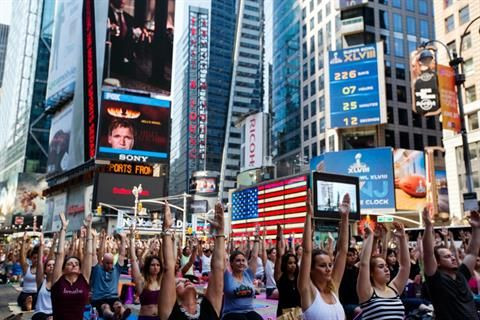New Yorkers Hate Times Square, Despite Twitter Study On NYC 'Happiness'

A new study purports to measure public sentiment in New York City, but it ultimately ends up highlighting the folly of Twitter-fueled research.
Analyzing more than 600,000 geo-tagged tweets over the course of two weeks in April 2012, researchers at the New England Complex Systems Institute created an initial classifier based on emoticons and later assigned a “sentiment score” to each tweet in their data-set. The results, published in a color-coded “sentiment map” and released on Tuesday, are sure to perplex and exasperate the more than 8.3 million people who call New York City home.
Here’s the gist of it, according to the researchers:
“Sentiment [in New York City] progressively improves with proximity to Times Square. Periodic patterns of sentiment fluctuate on both a daily and a weekly scale: More positive tweets are posted on weekends than on weekdays, with a daily peak in sentiment around midnight and a nadir between 9:00 a.m. and noon.”
That’s right. Times Square, home of the Naked Cowboy and a wax statue of Justin Bieber, is the "center of happiness" in the Big Apple. No, this is not an alternate universe where chain restaurants are delightful, Disney is the apex of high culture, and having your picture taken with a man in a filthy Spider-Man costume is appealing. This is the burgeoning world of Twitter-sentiment analysis, a world where "up is down" and "black is white" if only because the tweets say it is so. And we all know tweets don’t lie.
Given that social media platforms like Twitter and Facebook offer an unprecedented real-time window into human communications, it’s no surprise that sentiment analysis via social media is emerging as its own distinct field of study. Admittedly, there is something irresistible about the idea that tweets, status updates or LinkedIn posts can offer true insights into the state of our collective psyche.
It’s unclear who came up with the idea to measure such things via social media, but Twitter-sentiment analysis has been all the rage since at least the 2012 presidential campaign, when researchers at the University of Southern California’s Annenberg Innovation Lab mined hashtags to gauge users’ feelings about different political events. (The takeaway from that study? Politics are polarizing.)
Mind you, there is nothing inherently wrong with Twitter-sentiment studies, inasmuch as researchers understand that the level of insight one can glean from an emoticon is directly proportionate to the wisdom of a population subset that uses emoticons.
But shouldn’t there be some ethical guideline that requires researchers to visit New York City at least once before they’re allowed to conduct a study on its public sentiment? Because clearly anyone who would conclude that Times Square is even remotely happy has never actually been to Times Square. They’ve never had to wade through a sea of a million-plus tourists squeezed into a five-block radius during rush hour. They’ve never had to stop and give directions to that one person on earth who hasn’t discovered the miracle of numbered streets. They’ve never had to fend off the Elmo brigade, or the man with the hairless cat on his shoulder, or the lady selling Obama condoms (“feel like the First Lady every time!”), or the obnoxiously peppy youngsters asking you if you like comedy shows. And they’ve probably never had to dodge a large family of Wisconsonites meandering aimlessly around the M&M store, bumping into each other like marbles in a game of Hungry Hungry Hippos.
None of these things can be described as happy, and yet they define the Times Square experience for the average New Yorker. It’s why we try to avoid it at all costs, and why we look at people cross-eyed when they ask us if we’re going there for New Year’s Eve.
And when we do invariably end up in Times Square -- usually for business meeting with an out-of-towner or because the number 7 subway isn’t running -- it’s all we can do to scream, “Never again!”
That is until we catch a glimpse of that tourist, who just showed up from God knows where, and who looks up at those bright lights and massive LCD billboards, and whose face beams with excitement because he or she’s seeing it all for the first time. And then we realize that we’ve lost something, because we’ve lived here for so long that we can no longer appreciate the raw thrill of being in one of the most visited sites on earth. And we kind of envy that tourist.
It’s a nice sentiment, but not one that is likely to be picked up by a research study -- if only because most of us are too busy to tweet about it.
Read the full Twitter-sentiment study here.
© Copyright IBTimes 2024. All rights reserved.






















